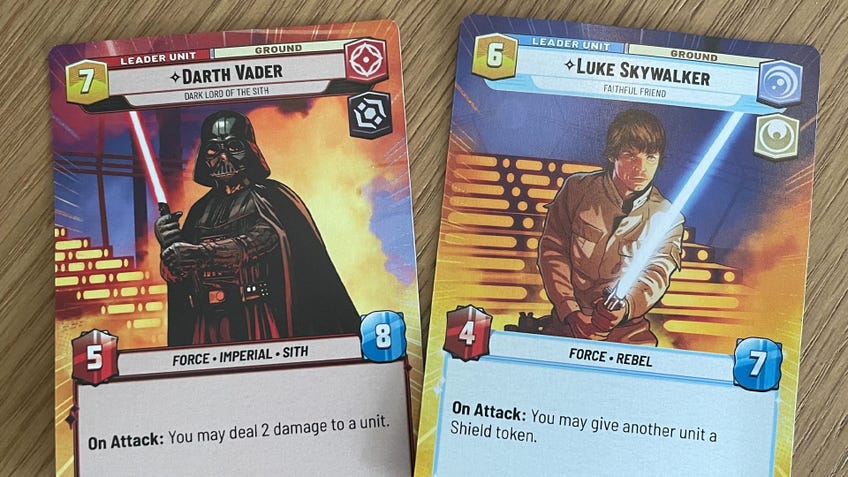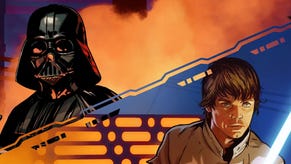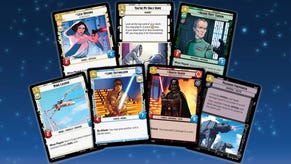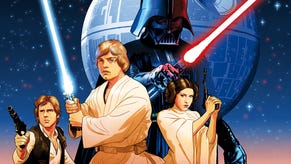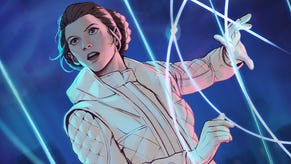Star Wars: Unlimited's fan-pleasing trading card game struggles to escape the shadow of its peers
A good TCG at the wrong time?
You have to feel for the makers of Star Wars: Unlimited. If launching a trading card game at any time in the enormous shadows of Magic: The Gathering and Pokémon has never been easy, finding breathing room for your game alongside the biggest TCG to arrive in decades - Disney Lorcana - feels like an impossibility.
It was this prevailing mood that couldn’t help but creep into my time with Star Wars: Unlimited at this year’s Gen Con, ahead of the TCG’s planned release next year. During a demo match of the upcoming two-player game, I found it to be a completely serviceable take on translating the galaxy far, far away into a TCG - one that, in any other year, would’ve shone far brighter had it not been placed immediately next to the red-hot glow (and staggering queues) of its fellow Disney-owned compatriot.
It’s these comparisons that are hard to avoid in Unlimited. After all, it’s a game most easily described as a mash-up of familiar parts from other well-known TCGs, blended with the familiar universe of Star Wars. That's not necessarily a bad thing, but one that leaves the game needing to fight to establish its voice in a very noisy genre.
Unlimited feels most confident and accomplished in its distinctly Star Wars touches.
Players control a 50-card deck headed up by a leader - such as Luke Skywalker or Darth Vader - who sits outside their main deck as a force able to be called in at clutch moments, much like Magic: The Gathering’s popular Commander format. The cards in your deck can be played to two different battlefields - ground or space - much like MTG maker Wizards of the Coast’s old Star Wars: Trading Card Game. Players perform only a single action on their turn, like Unlimited publisher Fantasy Flight Games’ defunct Star Wars dice-and-card game Destiny (RIP). And, yes, being able to add any card in your hand facedown to your stock of resources - used to play cards and activate abilities - has an unfortunate uncanniness with Lorcana’s own inkwell mechanism.
All that’s not to say that Star Wars: Unlimited isn’t perfectly enjoyable on its own terms. During my roughly 45-minute match, I found myself increasingly invested in the best way to target my opponent’s Imperial base, whittling it down from its 30 starting health to zero before they could leave my own Rebel hideout on Cloud City in ruins.
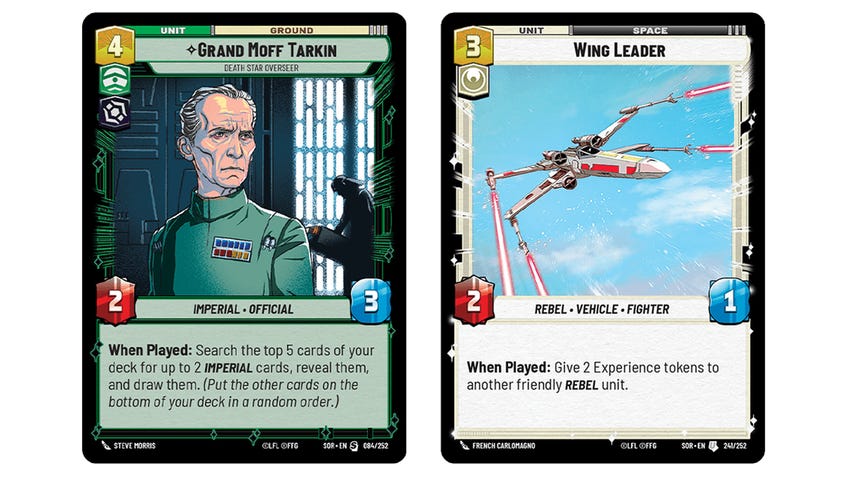
Where Unlimited feels most confident and accomplished is in its distinctly Star Wars touches. Each player’s separate lanes for ground and space units give it an individual feel from the everything-together fights of MTG and other traditional TCGs, with units only able to engage in battle if they’re in the same theater of combat or have specific rules allowing them to cross between. This also means ensuring your deck is balanced between ground and space troops, or risk leaving a hole in your defences.
On top of its mechanical seasoning, it’s a neatly thematic way to capture the split action of the movies - and video games like the Battlefront series - as lightsabers clash and blaster shots ring out on the planet surface as X-Wings and TIE Fighters scream overhead. Battles feel cinematic and grounded, without feeling bland; you might not be able to have Luke slice his way through a Star Destroyer, but having him dispatch a line of Stormtroopers is just as satisfying.
The leaders are another highlight, with Luke and Vader - heading up our demo decks - entering the field with the forceful (pun intended) presence you’d hope for from the Jedi and Sith masters. Leaders can be summoned by activating their Epic Action - in the case of Luke and Darth, once their players have amassed enough resources - upon which they twist from their horizontal side at the side of the battle to an upright vertical stance in the combat area. It’s a tangible, engaging way to make the characters matter, especially as they come with some hefty stats and powers to boot. Unlike MTG Commander’s increasing cost to resummon defeated characters, though, they can only be deployed once per game - making the timing of when to unleash them an even more crux decision.
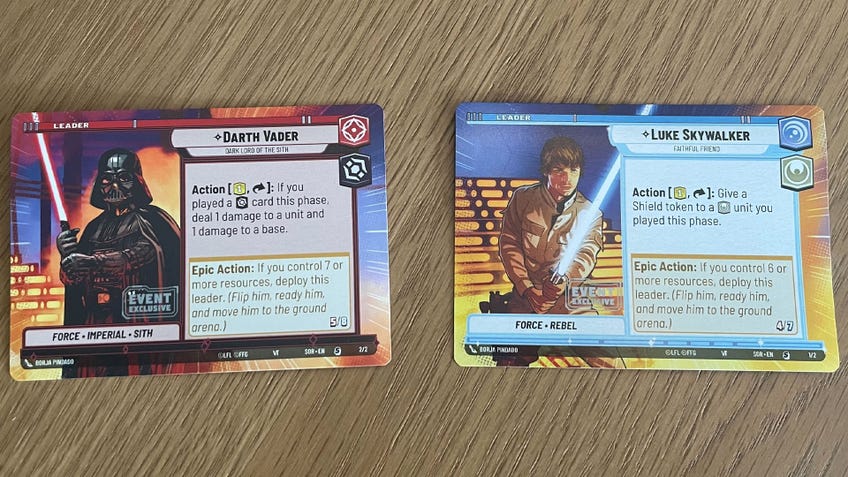
Unlimited aims for a snappier play experience than many other TCGs, limiting players to a single action on your turn - whether that’s playing a card, activating an ability or attacking an opposing character or your rival’s base - before bouncing back to your opponent. While it sounds appealing in concept, and each player’s turn does indeed move quickly by itself, I found the wider round-based structure as a whole to feel a little sluggish.
While Unlimited aims for a snappier play experience than many other TCGs, I found the wider round-based structure as a whole to feel a little sluggish.
Once both players pass - having exhausted their possible actions - the first person to pass takes the initiative, allowing them to go first next round, before both players reset their exhausted cards (including characters they played that round, like MTG’s summoning sickness), draw two cards and choose whether to add a card from their hand to their resource pile. Having to potentially wait multiple turns until the next round to be able to use characters played to the field slowed the pacey attack-and-counterattack feel of the game, exacerbated by the current lack of any immediate card effects that can interrupt your opponent on their turn.
There was also a feeling of disconnect in being able to openly target your opponent’s base, with no option for them to throw active characters in the way as a means of defence. The focus is clearly on using your characters to control the board and clear away cards that might damage you in return - focusing solely on your rival’s base is a quick way to suffer a crushing defeat - but the lack of direct response as players trade blows (characters at least swap damage when they battle) made the central goal of launching an assault on your opponent’s base less confrontational than you might expect.
It’s worth noting here that we were using the game’s standard starter sets during a tutorial game, so there’s a very good chance that future cards and sets may layer in more ways to speed up your reactions and interact more with your opponent outside of a single action each turn. For now, the starter sets felt fairly basic - something that’s no doubt intended as a welcoming way to invite TCG newcomers into the game, but left question marks around the game’s long-term vision and potential for high-level play.
In a similar way, base cards currently serve only as a physical reminder of your base - splashed with a bit of artwork - as well as determining which colours you can include in your deck, rather than playing a larger role in gameplay. Unlimited’s designers told Dicebreaker that this could well change in the future, with the potential for future sets to add mechanical variety and a more active role in battles, but for now they remain mostly a dash of flavour beyond your initial deck construction.
I was left conflicted by my brief time with Star Wars: Unlimited. In any other year, this would be a completely acceptable and enjoyable TCG, one that goes beyond being a mere Magic: The Gathering clone and embraces its ties to the Star Wars galaxy in ways that do right by its characters and inspirations. But with the trading card game scene hotter than it’s ever been, and likely to only get hotter before Unlimited arrives in 2024, it feels like the bar has been raised that much higher - and I fear Unlimited’s passable but ultimately unremarkable gameplay may struggle to keep up.
